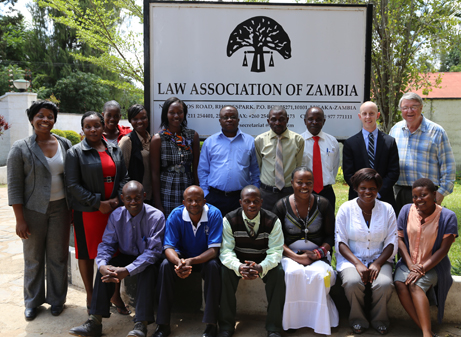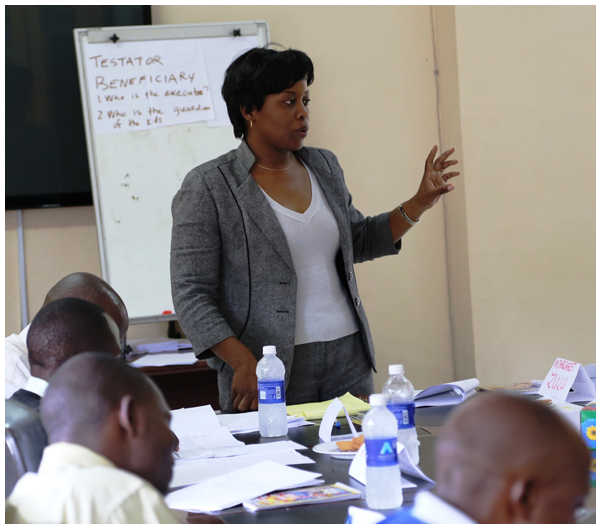
 World Justice Challenge
World Justice Challenge grantee Street Law Zambia (SLZ) updates us on a recent visit to Zambia, where they conducted teacher trainings and curriculum development. SLZ believes that education is the key to sustainable social change in Zambia. Their primary goal is to develop and dissimenate a curriculum built on relevant, interactive, law-related content.
According to Jones Mbale, a veteran school teacher at Lilayi Primary School in Lusaka, Zambia, the only problem with Street Law Zambia’s (SLZ) teacher training was that it was not long enough. Along with teachers from twelve different Lusaka schools, Mr. Mbale received a two-day training from SLZ that introduced teachers to SLZ’s legal education curriculum. The teacher training marked the official beginning of SLZ’s curriculum rollout into youth clubs and classrooms in Lusaka. SLZ’s curriculum, which targets youths between the ages of twelve and fifteen, directs youths’ attention to critical police responsibility and gender-based violence issues.
Teachers showed strong enthusiasm and engagement with the legal education training. In fact, at several points during the training the lessons ran long due to the sheer volume of questions. The success of the SLZ teacher training can be attributed to the collaborative effort of all involved, including the teachers themselves. Remarked Pamela Mumbi, SLZ Co-founder, “[the teachers] were thinking and engaged, and using this curriculum is something that they want to do. You could just see it by the expression on their faces.” Ms. Mumbi, along with Nathan Nanfelt, SLZ Co-founder, and Professor Ed O’Brien, Director Emeritus of Street Law, Inc., facilitated the teacher training. High Court Judge, Gertrude Chawatama, Board Chairperson of Zambia Civic Education Association, Chris Chirwa, as well as the President of the Law Association of Zambia, James Banda, also made guest appearances in support of the project.

SLZ’s teacher training provided teachers with both the pedagogical tools as well as the content to implement SLZ’s legal education curriculum effectively. SLZ’s pedagogy emphasizes student interaction and engagement. Through use of sketches, for example, students role play human rights abuse situations, later replaying the situations in ways that show appropriate responses. SLZ’s curriculum also introduces students to selected decisions by the Supreme Court of Zambia, inviting students to debate simplified case studies. Games and a scripted mock trial are also integral to SLZ’s teaching methods.
Beyond training teachers on the pedagogy underlying SLZ’s legal education curriculum, SLZ instructed teachers on important content. Some of the content—an overview of human rights, for example—was review. Other content, such as a discussion of the Anti-Gender-Based Violence Act (Anti-GBV Act) introduced new ideas. As Ms. Mumbi commented, “I think a lot of the Anti-GBV Act was new, which is why there were a lot of questions. Teachers showed a hunger, which is a good problem to have. They wanted to know more.” Teachers also strongly engaged with an introductory lesson on Testate Law that included instruction on how to draft a simplified will, a tool useful to protecting children from land grabbing.
Since the conclusion of SLZ’s teacher training, a clear and direct impact has unfolded: starting this next school term, teachers in twelve Lusaka schools will now implement SLZ’s legal education curriculum in youth clubs and classrooms. SLZ provided teachers with copies of an accompanying student handbook, so teachers from under-resourced schools can implement the program without the added obstacle of paying for student copies. With their SLZ materials in hand and their SLZ training complete, these teachers are optimistic about the impact of the program on their students. As Mr. Mbale commented, “By giving this information to the pupils, even the parents will be helped.” With committed teachers like Mr. Mbale empowering Zambia’s youth through education, hope is on the horizon.
****
Photo Credit: Workshops, group photo/Street Law Zambia






